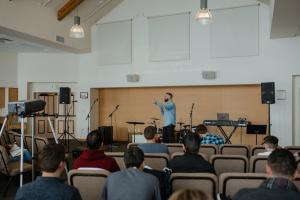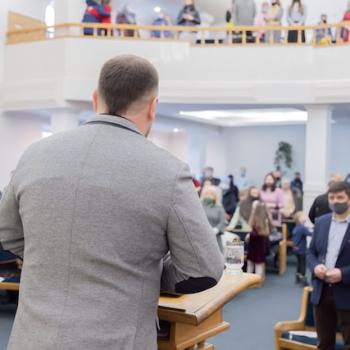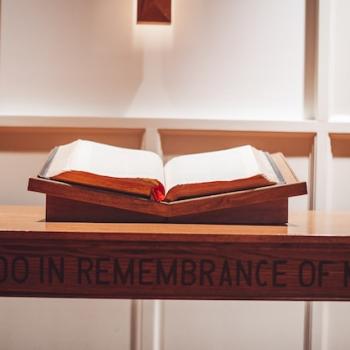A friend shared Alexander Lang’s blog post “Departure: Why I Left the Church” with me recently. Like many others, I have thoughts and feelings. So many thoughts and feelings. Mostly centered around these questions: What do we expect from our pastors? What is a pastor, really?
I’m fascinated by the assumptions we make around what a pastor’s role should be. (And by “we,” I mean pastors and parishioners alike, even if in different ways.) And I wonder how we can rethink some of these things.
I hope to add something productive to the conversation—not to shame or attack Alexander Lang, but to push back on some of the assumptions I feel as I read his words. And to see if we can build a better way together.
Two thoughts, for starters:
1. Let’s make preaching less exhausting.

Lang writes, “I was exhausted from writing, memorizing and preaching sermons week after week for 10 years.”
He says that’s not at all the whole story of why he left the pastorate, but it’s part of the story.
And I get it. Sort of. I haven’t preached every week straight for ten years. (That does sound exhausting!) But I’ve preached plenty of sermons, and I get that each one takes a lot out of you.
I wonder, though. Perhaps there are ways we can make preaching less exhausting.
For example: Does a sermon really need to be memorized? Or does the preacher just need to be familiar enough with the material so that she can look up, make eye contact with the congregation, connect with people and gauge their reactions, and adjust some parts of the sermon in the moment as needed?
I also wonder: How long does a sermon need to be?
Personally, I find that the shorter the sermon, the less time-consuming the preparation. I’ve preached sermons ranging from about 7 minutes (cute little mini-sermons like this one and this one) to over 30 minutes. The difference in prep time, as one might expect, is significant.
Sure, it can take some deep thinking to figure out how to say something meaningful succinctly. But once you know where you’re going, the less you actually have to write—and memorize, if you really want to memorize it—the easier the preparation.
Plus, congregations’ attention spans are short. We forget so much of what we hear. Often, the more streamlined a sermon is, the better.
Maybe we as preachers don’t need to make all the points we might want to make. Maybe we can just pick one point, tell a good story about it, and let that be enough. Maybe a 15-minute sermon can be just as effective as a 45-minute one—and much less exhausting for everyone involved.
I also think about the week in, week out, nature of the preaching role. This, too, doesn’t have to be that way.
The senior pastor at my current church is always sharing the pulpit, always inviting others to preach and share. Sometimes the “sermon” time is more of a conversation. Other times, we switch things up entirely.
We spent the whole month of August, for example, hearing stories and reflections from people in the congregation. No formal sermons. I loved hearing about different people’s experiences. And the usual preachers got to take the month off from preaching—and are (hopefully) back now with renewed energy.
Pastors: Does it always have to be you, doing the preaching? How can we share the responsibility, burden, and delight of preaching with others who have a gift and interest in it? How can we mentor younger preachers and give them opportunities to learn how to preach?
Let’s make preaching less exhausting.
2. Let’s let go of the 24/7 sense of responsibility.
Lang goes on to reflect, “Being a pastor is like being a parent. You can imagine what it’s like to have a child, but until you are in the role, you cannot fully appreciate what it’s like to shoulder the responsibility of caring for a life 24/7.”
To be fair, I’ve never been either a senior pastor or a parent. I have no doubt that there are so many things I don’t fully understand about both roles.
But I have worked in full-time ministry, in what was basically a college pastor role. I wasn’t the senior pastor of a church, and that is different. But some of the pressures were similar.

I did have to push back against a sense of 24/7 responsibility. And I’m strongly with therapist Clint Schnekloth in his encouragement to set boundaries. Being a pastor—or in any role where you could be “on” 24/7—is all about boundaries. So many boundaries.
Sure, as a pastor you work most Sundays, and many Saturdays too—when there’s a wedding, funeral, or other special event. So, you choose a day or two during the week to take off. You say, Fridays are my day off. And you stick to it.
In many cases, no one is going to hand this to you. You have to choose to set boundaries around your time so that you can get the rest and refreshment you need in order to be a healthy human. And in order to make pastoral ministry sustainable.
Fortunately, as a pastor, you are not the only person who can do most of the things you do. (If this sounds humbling, let it be humbling.)
Yes, you are wonderful. But no, your congregation does not need your 24/7 availability.
You can pull together teams of people—staff and/or volunteers—who can take care of the things that need to be taken care of on your day(s) off.
Because really, you are not a parent. The adults in the congregation are, well, adults. You aren’t there to “parent” them 24/7. You’re there to help them connect with and serve one another in meaningful ways such that their needs are taken care of—by one another, in community.
To me as a parishioner, that’s a much more compelling vision. I want to care for others in my community. And I want to be cared for—not just by the pastor, but by the community.
I don’t want to be dependent on a pastor. I want to be part of a loving community.
Work/life balance is a struggle for lots and lots of people in lots and lots of different careers. Maybe a pastor, rather than trying to be “on” 24/7, can try to model a healthy balance. To model setting boundaries. To model saying no to things. (Building our “no” muscles, if you will.) To model delegating tasks to others, sharing leadership and responsibility.
Maybe a pastor can seek personal freedom from that 24/7 capitalist drive toward a very particular definition of productivity—and maybe, in doing so, she helps congregants find their own liberation too.
That’s what I’ve got for now. I’m sure there will be more. In the meanwhile, feel free to hit up the comments with your own thoughts and feels. If you’ve spent much time in church, I’m sure you have them.
Let’s figure out how we do this pastoring thing—and really, this church thing—in healthier ways together.












